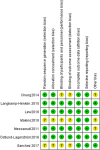Efficacy of probiotics on stress in healthy volunteers: A systematic review and meta-analysis based on randomized controlled trials
- PMID: 32662591
- PMCID: PMC7507034
- DOI: 10.1002/brb3.1699
Efficacy of probiotics on stress in healthy volunteers: A systematic review and meta-analysis based on randomized controlled trials
Abstract
Background: Probiotics seems to play a beneficial role in stressed populations; thus, a systematic review and meta-analysis to assess the effects of probiotics on stress in healthy subjects were conducted.
Methods: Randomized controlled trials on the effects of probiotics on stress in healthy subjects were retrieved from five databases. The effects of probiotics on subjective stress level, stress-related subthreshold anxiety/depression level, cortisol level, and adverse reactions were analyzed. Separate subgroup analyses were conducted on single-strain probiotics versus multi-strain probiotics, and short-term administration versus long-term administration.
Results: Seven studies were included, involving a total of 1,146 subjects. All the studies were rated as low or moderate risk of bias. Our research found that probiotic administration can generally reduce the subjective stress level of healthy volunteers and may improve their stress-related subthreshold anxiety/depression level, but no significant effect was observed in the subgroup analysis. The effect of probiotics on cortisol level was not significant. Adverse reactions were reported in only one of seven studies, but left undescribed.
Conclusion: Current evidence suggests that probiotics can reduce subjective stress level in healthy volunteers and may alleviate stress-related subthreshold anxiety/depression level, without significant effect on cortisol level, and there is not enough support to draw conclusions about adverse effects; thus, more reliable evidence from clinical trials is needed.
Keywords: gastrointestinal microbiome; healthy volunteers; meta-analysis; probiotics; psychological stress; systematic review.
© 2020 The Authors. Brain and Behavior published by Wiley Periodicals LLC.
Conflict of interest statement
The authors declare no conflict of interest.
Figures










References
-
- Bailey, M. T. , Dowd, S. E. , Galley, J. D. , Hufnagle, A. R. , Allen, R. G. , & Lyte, M. (2011). Exposure to a social stressor alters the structure of the intestinal microbiota: Implications for stressor‐induced immunomodulation. Brain, Behavior, and Immunity, 25(3), 397–407. 10.1016/j.bbi.2010.10.023 - DOI - PMC - PubMed
Publication types
MeSH terms
Substances
Grants and funding
LinkOut - more resources
Full Text Sources

